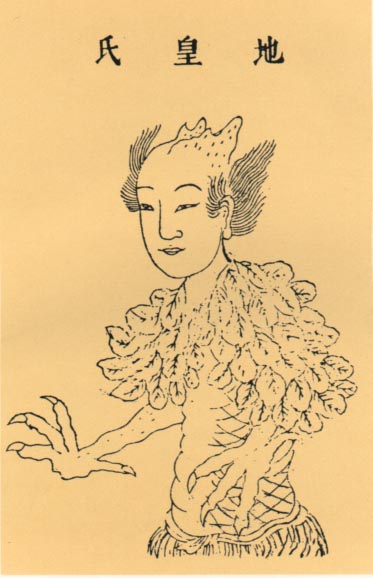Earthly Sovereign on:
[Wikipedia]
[Google]
[Amazon]
The Earthly Sovereign () was the second 
Chinese
Chinese can refer to:
* Something related to China
* Chinese people, people of Chinese nationality, citizenship, and/or ethnicity
**''Zhonghua minzu'', the supra-ethnic concept of the Chinese nation
** List of ethnic groups in China, people of ...
legendary king after Pangu
Pangu (, ) is a primordial being and creation figure in Chinese mythology who separated heaven and earth and became geographic features such as mountains and rivers.
Legends
The first writer to record the myth of Pangu was Xu Zheng during t ...
's era. According to ''Yiwen Leiju
The ''Yiwen Leiju'' is a Chinese ''leishu'' encyclopedia completed by Ouyang Xun in 624 under the Tang. Its other contributors included Linghu Defen and Chen Shuda.
It is divided into 47 sections and many subsections. It covers a vast number of ...
'', he was the second of the Three Sovereigns
The Three Sovereigns and Five Emperors were two groups of mythological rulers in ancient north China. The Three Sovereigns supposedly lived long before The Five Emperors, who have been assigned dates in a period from 3162 BC to 2070 BC. Today ...
.

Biography
According to the "Basic Annals of the Three Sovereigns" (三皇本紀) inSima Zhen
Sima Zhen (; 679–732), courtesy name Zizheng (Tzu-cheng; 子正), was a Tang dynasty Chinese historian born in what is now Jiaozuo, Henan.
Sima Zhen was one of the most important commentators on the ''Shiji
''Records of the Grand Histo ...
’s supplement to the ''Records of the Grand Historian
''Records of the Grand Historian'', also known by its Chinese name ''Shiji'', is a monumental history of China that is the first of China's 24 dynastic histories. The ''Records'' was written in the early 1st century by the ancient Chinese hist ...
'':
*Dìhuáng had eleven heads, was the king ruling under the influence( De) of the element fire (火德王).
*And, Dìhuáng was a king of many achievements, had eleven brothers, died aged eighteen thousand years old.
After he was born, the world was filled in chaos. That year, the sun and the moon born from two eyes of Pangu
Pangu (, ) is a primordial being and creation figure in Chinese mythology who separated heaven and earth and became geographic features such as mountains and rivers.
Legends
The first writer to record the myth of Pangu was Xu Zheng during t ...
, the stars from Pangu’s hairs couldn't move smoothly and correctly, which caused many days without sun, or many days with the sun shined throughout the whole day, or many dangerous fallen star accidents. With his power, Dìhuáng corrected the false. He made the sun and the moon move correctly, and stipulated the days of a month and the months of a year.
Dìhuáng's rule lasted eleven thousand years.
He created Mount Xiong'er (熊耳山 ''Xióng'ĕr Shān'') and Mount Longmen (龍門山 ''Lóngmén Shān''). His successor was the Human Sovereign
The Human Sovereign (), otherwise called the Sovereign of Man, was the third Chinese legendary king after Pangu's era. According to ''Yiwen Leiju'', he was the third and last of the Three Sovereigns.
Biography
According to the "Basic Annals of ...
.
See also
*Chinese mythology
Chinese mythology () is mythology that has been passed down in oral form or recorded in literature in the geographic area now known as Greater China. Chinese mythology includes many varied myths from regional and cultural traditions.
Much of t ...
References
, - {{s-end Three Sovereigns and Five Emperors Chinese monarchs